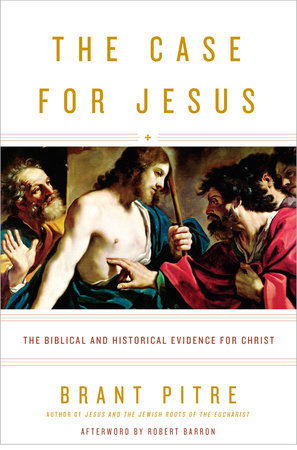
Editor’s note: This post originally appeared on Think Apologetics. Tabernacle of David considers this resource trustworthy and Biblically sound.
.

If you haven’t picked up The Case for Jesus: The Biblical and Historical Evidence for Christ
Pitre, notes there were three stages in the formation of the Gospels. This is nice summary of the role of the oral tradition/the memory aspect to the formation of the Gospels. He says the following:
Stage 1. The Life and Teaching of Jesus:
As a Jewish “rabbi” (rabbi), Jesus “taught” (didaskō) his “students” (mathētai) in the context of a rabbi-student relationship. His students lived with him and learned from him for some three years. During this time, Jesus expected his students to “remember” (mnēmoneuō) what he said and instructed them to begin “teaching” (didaskō) others while he was still alive (see Mark 4:1-20; 6:1-13, 30; 8:18; 9:5; 11:21; and parallels).
Stage 2. The Preaching of Jesus’s Students:
After Jesus’s death, the students of Jesus “remembered” (mnēmoneuō) what he had said and done, and they “taught” (didaskō) others about what they had seen and heard. Their preaching was based on the skilled memories of trained students and the rehearsed memories of disciples who repeatedly preached about what Jesus said and did (see John 2:22; 12:16; 15:20; 16:4; Acts 4:2-20; 20:35).
Stage 3. The Writing of the Gospels
Eventually, the evangelists “wrote” (graphō) either what they themselves “witnessed” (martyreō) or what was “handed on” (paradidōmi) to them by “eyewitnesses” (autoptai) who were present with Jesus “from the beginning” (see Luke 1:1-4; John 21:24). If this description of the stages of tradition through which the life and teaching of Jesus have come down to us is basically correct, then three important implications follow. First, Jesus’s disciples were students who remembered what he did and what he said. Although nowadays we tend to use the word “disciple” to refer to a “believer,” in the first century AD, it literally meant “student” (Greek mathētēs; Hebrew talmid).9 Being a student in the ancient world was radically different from what it is like today, when it simply means you may (or may not) listen to a fifty-minute lecture three times a week for a semester. Being one of Jesus’s students meant following him everywhere, and listening to him all the time, for anywhere between one and three years. As the Gospels make clear, it also meant remembering what he said (Matthew 16:9; Mark 8:18; John 15:20; 16:4). In the words of John Meier: Jesus called individuals to follow him literary, physically, as he undertook various preaching tours of Galilee, Judea and surrounding areas…. Following Jesus as his disciple meant leaving behind one’s home, parents, and livelihood. One could not follow Jesus simply by staying at home and studying his teachings or by going to his school-house and attending his lectures.
If we take seriously the evidence for the apostolic origins of the Gospels, then the four Gospels are not based on the memories of just anybody. They either contain the memories of Jesus’s students (the Gospels of Matthew and John) or are based on the memories of Jesus’s students that were passed on to their followers (such as Mark’s record of Peter’s preaching). Even Luke’s Gospel claims to be based on the testimony of those who were eyewitnesses “from the beginning” of Jesus’s public ministry (Luke 1:1). Notice how different this is from the now widespread theory that our information about Jesus is primarily based on decade after decade of anonymous storytelling. Of course uncontrolled stories about Jesus circulated; the Gospel of Luke even mentions anonymous “reports” (Greek ēchos) making the rounds during Jesus’s lifetime (Luke 4:37).
However, as I have argued in earlier chapters, that’s not what the four Gospels claim to be. They are not the last links in a long chain of anonymous rumors and stories. They are ancient biographies and authoritative accounts of the life of Jesus based on the testimony of his students. As such, they function in part precisely as controls over what was being said about Jesus.11 Second, in the years between Jesus’s death and the writing of the Gospels, the disciples of Jesus would have frequently rehearsed their memories in the course of preaching and teaching. In fact, as Dale Allison points out, the disciples would have likely begun “rehearsing” the teachings of Jesus already during his lifetime, starting with the first time they were sent on mission by Jesus himself (see Matthew 10:1-23; Mark 6:7-12; Luke 9:1-10).12 One reason this is important is that, as Richard Bauckham states, “Frequent recall is an important factor in both retaining the memory and retaining it accurately.”13 Anyone who is a teacher knows this to be true. I might not be able to tell you what I did last week, but I could give you a three-hour lecture about Jesus and the Jewish roots of the Last Supper with zero preparation because I have been talking about it all the time for the last ten years.14 That’s one key difference between rehearsed memories and incidental memories.”-Kindle Locations, 1516-1562.
Feel free to read more on this topic at our following links:
Jesus, the Gospels, and the Telephone Game Objection
Jewish Scripture and the Literacy of Jesus by Craig Evans
With no scripture in place, what controlled doctrine in the 1st century? By Darrell Bock
The Issue of Oral Tradition: Dr. Darrell Bock
How Reliable were the Oral traditions about Jesus? – Dr. Craig Keener
Mark Roberts on Oral Tradition/Telephone Game Objections
A Look at Oral Tradition/The Orality Phase of the Jesus Story
James M. Arlandson: Historical Reliability of the Gospels

